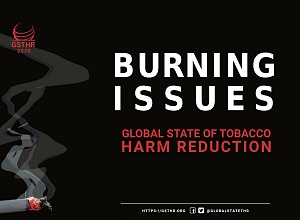A report from the Knowledge Action Change public health agency in the United Kingdom has revealed there are only nine users of safer nicotine products for every 100 smokers worldwide. Policy and regulations are denying smokers the right to harm reduction products while “millions of lives are at stake”, it says.
The report indicates that 80% of the world’s smokers live in low- and middle-income countries like South Africa.
People smoke for nicotine but they die from the tar, said KAC in a global webinar held last Wednesday 4 November 2020 to launch the report. “Many people want to quit, but repeatedly fail. What if 1.1 billion smokers had access to safer alternatives? And what happens if that access is denied? it asks.
The report, Burning Issues: The global state of tobacco harm reduction (GSTHR) 2020, was released at the webinar and its findings were presented. It found an urgent need to scale up tobacco harm-reduction if its full public health potential is to be realised.
“The global public health crisis of smoking is ongoing and deadly,” said the UK agency in a statement after the launch. “1.1 billion people smoke worldwide, a figure that has remained unchanged for two decades despite billions spent by governments and the World Health Organization (WHO) on tobacco control.
“Eight million people die due to smoking-related disease every year. The WHO estimates that one billion people will die of smoking-related diseases by 2100.”
Emeritus Professor at Imperial College London and KAC Director, Professor Gerry Stimson, said: “Denying smokers access to safer nicotine products is denying them their right to health – and millions of lives are at stake.”
He continued in the statement: “This is a decisive moment for the future health of 1.1 billion smokers around the world, who deserve better than the status quo. These numbers demonstrate the scale of consumer uptake and acceptance of these products as alternatives to combustible tobacco, which kills half its users.”
“Our data shows that, worldwide, millions of people are choosing to improve their own health by switching from combustible tobacco. But this needs to scale up, fast,” said the report’s Executive Editor Harry Shapiro.
“Tobacco harm reduction should become a genuine consumer-led public health success. But instead, we are seeing the start of a war on nicotine.”
Shapiro continued in the statement: “The urgent need to find new approaches is clear, especially in low-middle income groups, where tobacco control measures are often poorly or partially implemented, smoking rates are high or plateauing, population growth is increasing the number of smokers, and health systems are least able to treat smoking-related disease effectively or offer smokers support to quit.” The report found that:
- There are only nine safer nicotine product (SNP) users for every 100 smokers globally, mainly in high income countries.
- Overall, 98 million people are estimated to use safer nicotine products worldwide.
- Of those, 68 million are vapers, with the largest vaping populations in the US, China, the Russian Federation, the UK, France, Japan, Germany and Mexico.
- 20 million are heated tobacco product (HTP) users; with most HTP users in Japan, where cigarette sales have dropped by 32% since 2016 when HTP were launched.
- 10 million are US smokeless or snus users.
“Since safer nicotine products have become available, accessible and affordable in countries such as Japan, the UK and Iceland, existing declines in smoking rates have accelerated,” stated Stimson in the KAC statement.
“Yet despite the emergence of products that are demonstrably safer than combustible cigarettes, proven to be effective in smoking cessation and attractive to adult consumers who are quitting and switching in their millions, tobacco harm reduction continues to be seen by many in global health and tobacco control as a threat, not a public health opportunity.”
Experts call for change
During the launch, other expert speakers called for change, the statement continues. One was Samrat Chowdhery, President of the International Network of Nicotine Consumer Organisations and Director of the Association of Vapers India.
He said: “Given that over 80% of tobacco users are in low- and middle-income countries with meagre means to deal with tobacco-related consequences, the focus ought to be unwaveringly on harm prevention, by allowing people to exercise the choice of avoiding death and disease by switching to affordable and accessible risk-reduced alternatives.”
Guest speaker Professor David Nutt, founder of DrugScience and a professor of neuropsychopharmacology at Imperial College London, said: “My work leading a multicriteria decision analysis on the harms of different nicotine products back in 2013 contributed to the understanding that e-cigarettes are around 95% less harmful than cigarettes.
“Yet many so-called ‘experts’ rebuff scientific evidence on vaping or snus safety and deny relative harm data, while insulting and libelling scientists like myself. To reject the opportunity of tobacco harm reduction is, perhaps, the worst example of scientific denial since the Catholic Church banned the works of Copernicus in 1616.”
[link url="https://gsthr.org/resources/item/burning-issues-global-state-tobacco-harm-reduction-2020"]Burning Issues: The global state of tobacco harm reduction (GSTHR) 2020[/link]
[link url="https://kachange.eu"]Knowledge Action Change[/link]

